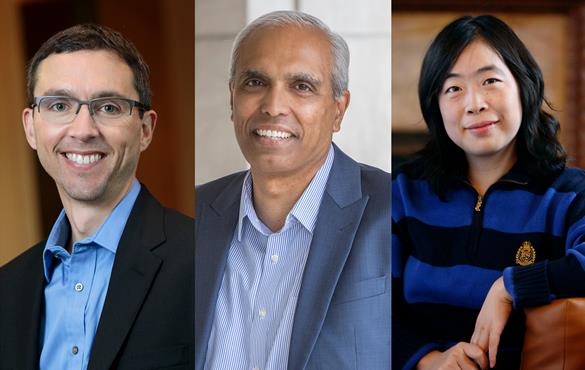McKelvey Engineering has three of world’s most ‘highly cited researchers’
Randall Martin, Rohit Pappu and Lan Yang are recognized for their work by the Institute for Scientific Information

The Institute for Scientific Information has named Randall Martin, Rohit Pappu and Lan Yang, all professors in the McKelvey School of Engineering at Washington University in St. Louis, among the most highly-cited researchers in the sciences by in 2021.
The annual list identifies 6,600 researchers from more than 70 countries and regions who demonstrated significant influence in their chosen field or fields through the publication of multiple highly cited papers during the last decade. Their names are drawn from the publications that rank in the top 1% by citations for field and publication year in the Web of Science citation index.
University-wide, 45 researchers made the 2021 list.
Martin, the Raymond R. Tucker Distinguished Professor in the Department of Energy, Environmental & Chemical engineering; Pappu, the Gene K. Beare Distinguished Professor in the Department of Biomedical Engineering; and Yang, the Edwin H. & Florence G. Skinner Professor in the Preston M. Green Department of Electrical & Systems Engineering, were among 45 faculty with primary affiliations at Washington University named to the list, which recognizes researchers worldwide who have demonstrated significant and broad influence reflected in their publication of multiple papers that have been highly cited by their peers over the course of the last decade. These papers rank in the top 1% by citations for these fields and year in Web of Science.
Martin's research focuses on characterizing atmospheric composition to inform effective policies surrounding major environmental and public health challenges ranging from air quality to climate change. He leads a research group at the interface of satellite remote sensing and global modeling, with applications that include population exposure for health studies, top-down constraints on emissions, and analysis of processes that affect atmospheric composition. He serves as co-model scientist for a leading global atmospheric model (GEOS-Chem), leads a global fine particulate matter network (SPARTAN) to evaluate and enhance satellite-based estimates of fine particulate matter, and on multiple science teams for satellite instruments including MAIA, TEMPO and GEMS. Data from his group are relied upon for a large number of assessments, including for the OECD Regional Well-Being Index, for World Health Organization estimates of global mortality due to fine particulate matter, for the Global Burden of Disease Project to examine the risk factors affecting global public health and for a wide range of health studies.
Pappu's research focuses on the form, functions and phase transitions of intrinsically disordered proteins and multivalent macromolecules. His work, which is driven by a combination of polymer physics theories, computational biophysics, machine learning and biochemical experiments in vitro and in living cells, is aimed at understanding how molecular matter is organized in space and time within cells. These foundational studies have a direct impact on the mechanisms that underlie the onset of neurodegeneration and the processes that enable cell proliferation in cancer. The specific neurodegenerative diseases that Pappu focuses on include Huntington’s disease and amyotrophic lateral sclerosis (ALS). Pappu’s work is also enabling the design and discovery of novel, responsive protein- and peptide-based biomaterials for a variety of biotechnological applications. Pappu is a Mercator fellow of the German Research Foundation, fellow of the Biophysical Society, fellow of the American Institute for Medical and Biological Engineers, and fellow of the American Association for the Advancement of Science.
Yang’s research interests include fabrication, characterization and fundamental understanding of advanced nano/micro photonic devices with outstanding optical properties or novel features for unconventional control of light flow. Her group focuses on the silicon-chip-based, ultra-high-quality micro-resonators and their applications for sensing, lasing, nonlinear optics, environmental monitoring, biomedical research and communication. Her Laboratory of Micro/Nano Photonics Research Group has demonstrated the first on-chip micro-resonator-based particle sensors that can achieve not only detection but also size measurement of single nanoparticles one by one. Different materials with tailored chemical compositions and nanostructures are used in her research to achieve advanced micro/nano photonic devices with desired properties, such as nonreciprocal light transmissions in a parity-time-symmetric optical resonator system, an all-optical analog of an electronic diode that allows current flow in one direction. Her research in non-Hermitian physics and exceptional points has unraveled a series of new discoveries leading to new approaches to control photonic structures, including loss engineering in a lasing system, chiral modes at exceptional points for directional lasing emission, and exceptional points enhanced sensing, etc. She is a fellow of IEEE, the American Physical Society, the Optical Society, and the American Association for the Advancement of Science. She has been serving as the editor-in-chief for Photonics Research since 2019.
Click on the topics below for more stories in those areas
- Global
- Women & Engineering
- Brief
- Research
- Electrical & Systems Engineering
- Biomedical Engineering
- Energy, Environmental & Chemical Engineering






